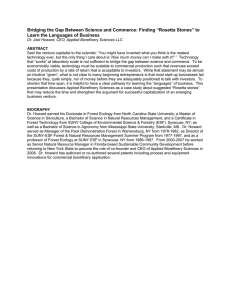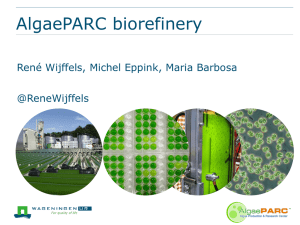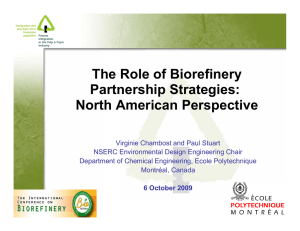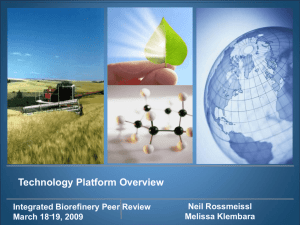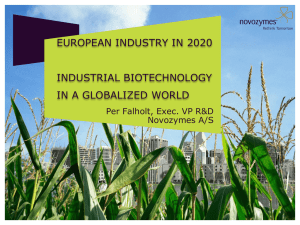Designing the Forest Biorefinery
advertisement
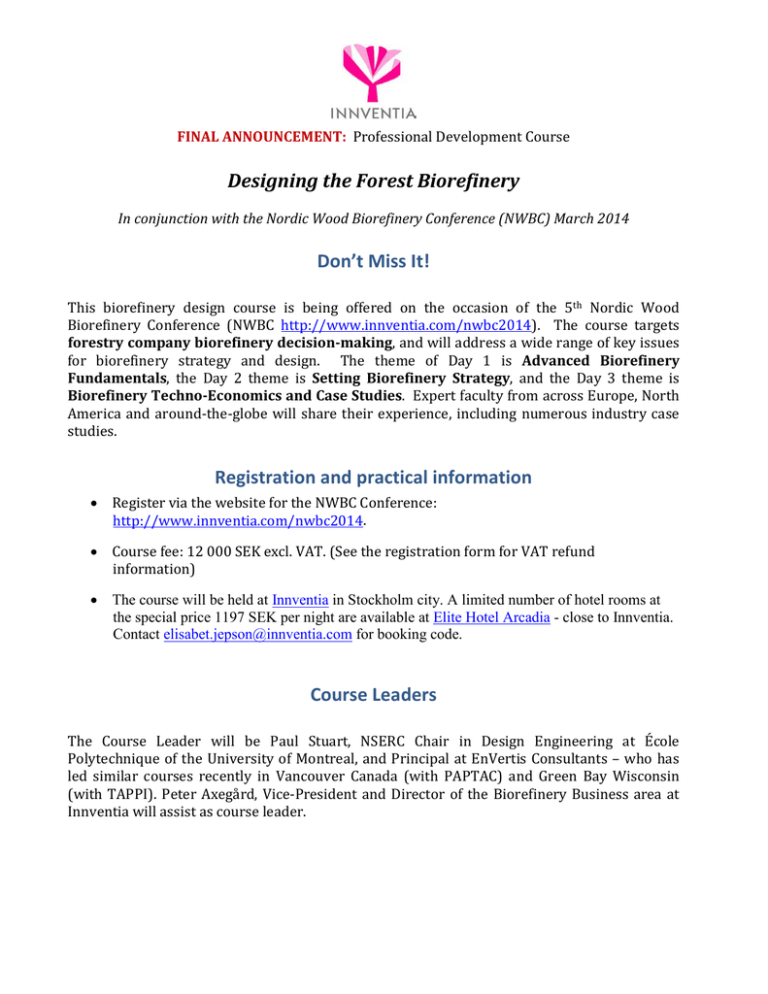
FINAL ANNOUNCEMENT: Professional Development Course Designing the Forest Biorefinery In conjunction with the Nordic Wood Biorefinery Conference (NWBC) March 2014 Don’t Miss It! This biorefinery design course is being offered on the occasion of the 5th Nordic Wood Biorefinery Conference (NWBC http://www.innventia.com/nwbc2014). The course targets forestry company biorefinery decision-making, and will address a wide range of key issues for biorefinery strategy and design. The theme of Day 1 is Advanced Biorefinery Fundamentals, the Day 2 theme is Setting Biorefinery Strategy, and the Day 3 theme is Biorefinery Techno-Economics and Case Studies. Expert faculty from across Europe, North America and around-the-globe will share their experience, including numerous industry case studies. Registration and practical information • Register via the website for the NWBC Conference: http://www.innventia.com/nwbc2014. • Course fee: 12 000 SEK excl. VAT. (See the registration form for VAT refund information) • The course will be held at Innventia in Stockholm city. A limited number of hotel rooms at the special price 1197 SEK per night are available at Elite Hotel Arcadia - close to Innventia. Contact elisabet.jepson@innventia.com for booking code. Course Leaders The Course Leader will be Paul Stuart, NSERC Chair in Design Engineering at École Polytechnique of the University of Montreal, and Principal at EnVertis Consultants – who has led similar courses recently in Vancouver Canada (with PAPTAC) and Green Bay Wisconsin (with TAPPI). Peter Axegård, Vice-President and Director of the Biorefinery Business area at Innventia will assist as course leader. World-Class Faculty Attached to this second announcement is the draft detailed course syllabus – including expert faculty from around the world. The course will be offered at the Innventia research centre, located in the north-east part of central Stockholm close to KTH, Sweden’s Royal Institute of Technology. The course will start at noon on Saturday 22 March, and continue for 2½ days through Monday 24 March. At the end of the course, you can plan to join the welcoming reception of NWBC at Innventia. A Unique Syllabus This is a critical time for the biorefinery development in the forestry sector – companies are at different points in setting their strategies, and a wide range of promising biorefinery productprocess options are being considered. What is the best solution, and how can technologies be systematically evaluated for competitive advantage? There is no silver bullet biorefinery solution, and many questions must be addressed by companies considering successful biorefinery implementation. This course will seek to address some of these, including for example: • Which biorefinery products will provide sustainably good margins over the long term? Which emerging biorefinery processes are the most promising for making these products? • What is an appropriate manner to implement lignin precipitation, and build a product portfolio of added-value products over time? • What are process efficiencies and operating costs today, and what might they be in 5 years from now after the process technologies have matured? • How do we best use existing mill infrastructure when implementing the biorefinery? • Can we implement the biorefinery, and at the same time lower the unit costs of our wood, pulp and paper products? What is the profitability of a pulp mill integrated with a biorefinery process, compared to one that is not integrated? The course format is designed to encourage exchange between instructors and participants. The emphasis on the course is not to present a series of potential biorefinery technologies, however exchanges on the strengths and weaknesses of specific technology strategies will be encouraged. The biorefinery course seeks to bring together forest industry leaders and management, leading technology providers and industry consultants to share their experience in developing biorefinery strategies, in order to better understand emerging biorefinery technologies and their design/implementation within business strategies. Who Should Attend? This course is intended primarily for (a) corporate personnel in forestry companies who wish to become more knowledgeable about biorefinery implementation strategy and design methods, as well as (b) mill managers and technical staff who seek to identify and select the best biorefinery strategy at the mill level. The course also seeks to provide knowledge for biorefinery technology providers and consultants to assist them in understanding how biorefinery evaluations can take place, and better understand the range of emerging biorefinery technologies and their design/implementation in a forest company business plan. Course Outline Day 1: Advanced Biorefinery Fundamentals Saturday 22 March 2014 11h00–11h15 11h15–13h00 13h00–13h15 13h15–14h00 14h00–14h45 14h45–15h30 15h30–15h45 15h45–16h30 16h30–17h15 17h15–18h00 WelcomeandIntroductions PaulStuart‐EcolePolytechniqueandEnVertisConsulting(MontrealQC) PeterAxegård–Innventia(Stockholm,Sweden) SystematicEvaluationoftheForestBiorefinery PaulStuart‐EcolePolytechniqueandEnVertisConsulting(MontrealQC) NetworkingBreakandLightSnack EUinitiatives‐Horizon2012andBiobasedIndustriesPPP PeterAxegård–Innventia(Stockholm,Sweden) Forest‐BasedBiorefininginChile AlexBerg–UniversidaddeConcepción(BiobíoChile) RenewaloftheForestSectorValueChaininSouthAustralia JohnKettle–VTT(HelsinkiFinland) NetworkingBreak ChemicalandPhysicalCharacterizationofWoodfortheBiorefinery AdriaanvanHeiningen–UniversityofMaine(OronoME) ThermochemicalProcessingofWood PatrikLöwnerts–Chemrec(StockholmSweden) RecapandDiscussion PanelIncludingSpeakersoftheDay Day 2: Setting Biorefinery Strategy Sunday 23 March 2014 07h30–08h00 08h00–08h15 08h15–09h45 09h40–10h00 10h00–11h30 11h30–12h15 12h15–13h00 13h00–14h00 14h00–14h45 14h45–15h00 15h00–16h00 16h00–17h30 17h30–18h00 CoffeeandCroissants AgendafortheDay PeterAxegård–Innventia(Stockholm,Sweden) EvaluatingProductStrategiesfortheForestBiorefinery VirginieChambost‐EnVertisConsulting(MontrealQC) NetworkingBreak BiorefineryDevelopmentandImplementation TomBrowne‐FPInnovations(Pointe‐ClaireQC) BiorefineryAlternativesUnderDevelopment PeterAxegård–Innventia(Stockholm,Sweden) Lunch EvaluatingBiorefineryStrategiesConsideringRiskandSustainability PaulStuart‐EnVertisConsulting(MontrealQC) KeySuccessFactorfortheSustainableBiorefinery: Added‐ValueBiorefineryPortfoliosViaUniqueSupplyChains PaulStuart‐EnVertisConsulting(MontrealQC) NetworkingBreak ProcessModelingandSystemAnalysisofPulpMillBiorefineries ÅsaSamuelsson/KarinLindgren–Innventia(StockholmSweden) BiorefineryDevelopments‐InfluenceofFuturePolicyInstruments ThoreBerntsson–ChalmersUniversityofTechnology(GöteborgSweden) RecapandDiscussion PanelIncludingSpeakersoftheDay Day 3: Biorefinery Techno‐Economics and Case Studies Monday 24 March 2014 07h30–08h00 CoffeeandCroissants 08h00–08h15 AgendafortheDay PaulStuart‐EcolePolytechniqueandEnVertisConsulting(MontrealQC) 08h15–09h00 WoodPulpingandBiorefineryProcesses AdriaanvanHeiningen–UniversityofMaine(OronoME) 09h00–09h45 BiobutanolfromLignocellulosicsforChemicalsand LiquidBiofuelsProduction AdriaanvanHeiningen–UniversityofMaine(OronoME) 09h45–10h00 NetworkingBreak 10h00–11h30 TheLignoBoostProcess PerTomani–Innventia(StockholmSweden) 11h30–12h15 TheLignoForceProcess LamfeddalKouisni–FPInnovations(Pointe‐ClaireQC) 12h15–13h00 Lunch 13h00–13h45 BiochemicalConversionTechnology ShijieLiu–SUNYESF(SyracuseNY) 13h45–14h30 OptionsforProducingHemicellulosesinaKraftPulpMill SverkerDanielsson–Innventia(StockholmSweden) 14h30–15h15 ValuePriortoPulping(VPP)‐ATechno‐EconomicAnalysis GopalGoyal–InternationalPaper(LovelandOH) 15h15–15h30 NetworkingBreak 15h30–16h15 HydroxyAcidSeparationfromBlackLiquor EemeliHytönen–VTT(HelsinkiFinland) 16h15–17h00 ProjectIndependence:CaseStudyoftheStrategyandDevelopmentofa BiorefineryProject DougFreeman–NewPage(EscanabaMI) 17h00–17h30 RecapandDiscussion PanelIncludingSpeakersoftheDay
